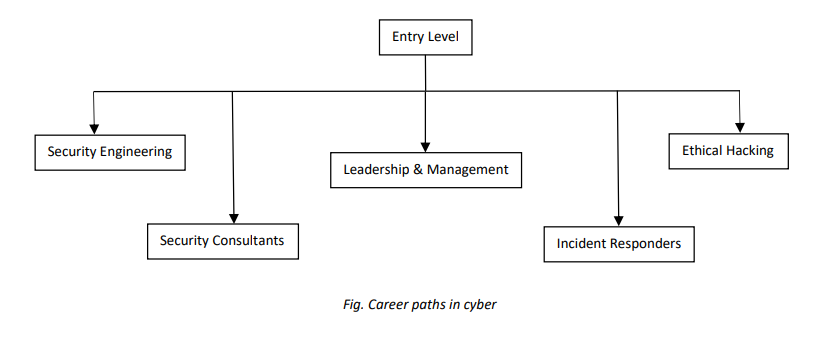
Pursuing a career in cybersecurity means joining a high in-demand industry. Reports claim that the number of cybersecurity jobs is expected to increase by 33 percent between 2020 and 2030. The COVID-19 pandemic and the Russo-Ukraine conflict have only accelerated this demand. As cybersecurity continues to grow in importance, more specialized roles are emerging.
Starting as a cybersecurity analyst creates opportunities to follow your interests within the world of information security and create a career path that’s right for you. Learn about five common career paths within this high-demand field.
1. Entry Level
If you’re new to cybersecurity, you may start out in an entry-level IT role such as a support assistant, helpdesk tech, network administrator, or software developer. Many cybersecurity professionals enter the field as junior information security analysts after some experience in IT. Cyber security roles are demanding with an expectation of core competencies. Before you apply for cyber security roles, take time to develop and master your core IT skills like programming, networks and systems administration, and cloud computing. While you don’t necessarily need a degree to get a job in cybersecurity, having
some form of structured training might accelerate your path toward a job. As a cybersecurity analyst, you can decide to take your career in a few different directions, depending on your interests and goals.

2. Engineering
If you enjoy tinkering with tech, you may consider security engineering as a career path. As a security engineer, you’ll use your knowledge of threats and vulnerabilities to build and implement defense systems against a range of security concerns. You may advance to become a security architect, responsible for your organization’s entire security infrastructure. Security engineering and architecture could be a good fit if you enjoy tinkering with technology and like to take a big picture approach to cybersecurity. As a security engineer, it’s your job to keep a company’s security systems up and running. This might involve implementing and testing new security features, planning computer and network upgrades, troubleshooting, and responding to security incidents.
Some key responsibilities may include:
• Identifying security measures to improve incident response
• Responding to security incidents
• Coordinating incident response across teams
• Performing security assessments and code audits
• Developing technical solutions to security vulnerabilities
• Researching new attack vectors and developing threat models
• Automating security improvements
Security engineers might start off as information security analysts. After gaining experience, you may go on to become a security architect, IT security manager, director of security, or even a chief information security officer.

3. Incident Responders
If you work well under pressure and have keen observational skills, you may consider Incidence responder as a career path. The field of incident response involves the next steps after a security incident. As an incident responder, you’ll monitor your company’s network and work to fix vulnerabilities and minimize loss when breaches occur. An Incident Responder, sometimes also referred to as an Intrusion Analyst or CSIRT Engineer, is basically a cyber first-responder. Another area of incident response involves digital forensics and cybercrime. Digital forensic investigators work with law enforcement to retrieve data from digital
devices and investigate cybercrimes. Your role will involve providing a rapid initial response to any IT Security threats, or incidents of cyber attacks on your organization. The job of the Incident Responder will
involve the use of a wide spectrum of forensic tools which will enable you to quickly investigate any issues as they develop. Once the cause of the problem has been identified, you will need to restrict any damage, provide immediate workarounds and, if possible, provide a solution or fix, so that any intrusion or threat to your organization is negated rapidly.
Some key responsibilities may include:
• Providing first-line response and initial management of any new or developing IT security related issues
• IT Security – Day to day tasks
• Security procedures, change management, training, and support
• Gap assessments, testing, and IT security fixes, tools, and countermeasures
4. Management
As you gain experience in cybersecurity, you may choose to advance toward a leadership position within your organization. Cyber security managers oversee an organization’s network and computer security
systems. In this role, you might manage security teams, coordinate between teams, and ensure security compliance. Typically, the highest security role in an organization is that of the chief information security
officer. Working in security at the executive level often means managing operations, policies, and budgets across the company’s security infrastructure. Management and administration could be a good
fit if you’re organized, an excellent communicator, have leadership skills, and enjoy working with people.
5. Security Consultants
Security consultants analyze and assess security systems and measures. They study and outline potential breaches and suggest applicable solutions. They may work for one company to oversee their security, or they may consult with other companies on security issues. Companies hire security consultants to test their computer and network systems for any vulnerabilities or security risks. In this role, you get to practice cybersecurity offense and defense by testing systems for vulnerabilities and making recommendations on how to strengthen those systems. Consulting could be a good fit if you enjoy a variety of challenges and have an engaging analytical mind.
The job responsibilities include:
• Testing and analyzing assets for potential security threats.
• Identifying possible security threats and determining the best security measures.
• Designing, implementing, and maintaining security protocols, policies, plans, and systems to cover all possible security threats.
• Coordinating and briefing a team of security specialists and assigning tasks.
• Meeting with clients to discuss security measures, provide information, and explained the designed system.
• Running risk assessment and security tests and designing countermeasures to eliminate as many potential risks as possible.
• Compiling and presenting reports on the test results.
• Suggesting improvements to existing security systems.
• Remaining up to date with the latest security systems, tools, trends, and technology.
• Training staff to recognize and defend against security breaches and risks.

6. Ethical Hacker
Ethical hacking goes by many names, offensive security, red team, white-hat hacking, etc. If you work in offensive security, you’ll take a proactive approach to cybersecurity. You’ll do this by playing the part
of the intruder, trying to find vulnerabilities before the bad guys do.
As a penetration tester, you’ll seek to identify and exploit system weaknesses to help companies build more secure systems. As an ethical hacker, you can try out even more attack vectors (like social
engineering) to reveal security weaknesses. Certified ethical hackers are cybersecurity experts who are employed to verify and improve the security of a company’s computer system. Their job is to conduct
advanced penetration tests on a company’s system and identify any breaches or weaknesses in the security setup. To ensure success as a certified ethical hacker, you should have advanced knowledge of
computer and internet security systems, high-level hacking skills, and the ability to create clear and concise reports. A top-notch certified ethical hacker quickly identifies security flaws and provides useful advice on how to improve the system.
Your responsibilities will include:
• Meeting with clients to discuss the security system currently in place.
• Researching the company’s system, network structure, and possible penetration sites.
• Conducting multiple penetration tests on the system.
• Identifying and recording security flaws and breaches.
• Identifying areas of high-level security.
• Reviewing and rating the security network.
• Creating suggestions for security upgrades.
• Compiling penetration test reports for the client.
• Conducting penetration tests once new security features have been implemented.
• Suggesting alternate upgrades.
7. How Much Can You Make As A Cyber Security Professional?
Cybersecurity professionals tend to get paid well for their skills, even at the entry level. As you gain experience and move into more advanced roles, salaries often rise accordingly.
Here’s a look at the approximate average salary of several cybersecurity jobs by roles:
• Intrusion detection specialist: $61,053
• Junior cybersecurity analyst: $67,070
• Digital forensic examiner: $75,265
• IT security administrator: $75,007
• Incident response analyst: $75,859
• Cybersecurity consultant: $93,805
• Information security analyst: $99,275
• Ethical hacker: $101,165
• Penetration tester: $102,405
• Security engineer: $111,691
• Cybersecurity manager: $132,180
• Security architect: $153,751
• Chief information security officer: $170,928
